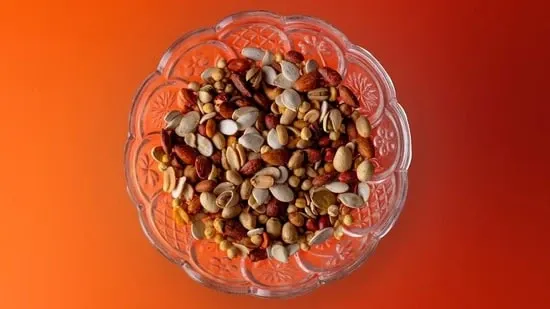Seeds and nuts are often hailed as superfoods, but did you know that eating them the wrong way can actually do more harm than good?
Holistic health nutritionist and diabetes educator Khushi Chhabra has shared the right ways of eating seeds and nuts, emphasizing that uninformed consumption can lead to health complications like hair fall, indigestion, less nutrient absorption, as well as skin issues like acne.
In an Instagram post from August 12, she highlights that "moderation is key when it comes to eating nuts and seeds" and overeating can not only cause digestive issues but also lead to weight gain. She urges mindful eating in the right form, at the right time, in order to maximise the benefits of their healthy fats and micronutrients.
Here's her expert guide to the right ways of eating popular seeds and nuts, from flaxseeds and chia to walnuts and almonds, so they work for you, not against you.
Flaxseeds
Flaxseeds are great for people with diabetes and menopausal women and Khushi recommends always consuming them in roasted and powdered form. The best time to eat flaxseeds is before meals in an empty stomach for maximum absorption, and can be ground and mixed with water or combined in smoothies, aata, chutney or curd. This improves blood sugar balance and the nutritionist states, "Limit daily intake to 1 tablespoon grounded flaxseed (never raw, always roasted)." She suggests adding roasted flaxseeds with black and white sesame seeds, in warm water mixed with jaggery, to help manage menopause symptoms.
Chia Seeds
The nutritionist recommends soaking chia seeds for at least 2-3 hours before consumption - eating dry chia seeds can cause bloating and you can even choke on them. Daily consumption should be limited to a maximum of 1 tablespoon, and can be added in smoothies, detox water, or puddings. According to Chhabra, the best time to consume chia seeds is first thing in the morning - in an empty stomach to reduce cravings and boost digestion - or before meals if weight loss is your concern, as it keeps you full for longer. She warns against consuming chia seeds post late afternoons. The nutritionist also adds a bonus tip - "Powder the chia seeds to improve their digestion and bodily benefits and always add lemon juice to improve their iron absorption."
Sesame seeds
Sesame seeds should always be consumed in roasted form without any added oil or salt; this helps release the natural oils. They can be eaten in raw and unsalted form when combined with salads, smoothies, or chutneys, however ingesting raw sesame seeds or in excess quantities can cause indigestion. Sesame seeds can be consumed any time of the day, but Khushi recommends eating them during midday. She also suggests adding sesame seeds with jaggery and dates to boost calcium absorption.
Pumpkin seeds
Khushi advises eating pumpkin seeds in plain roasted form, without any oil or salt. They are a rich source of magnesium and zinc but can cause digestive issues, in which case soaking them before eating helps. They can be consumed any time of the day but Khushi recommends eating them as an evening snack as it helps induce sleep; additionally she suggests avoiding salted or flavoured versions. Pumpkin seeds are great for women with PCOS and hormonal imbalances, and men with erectile dysfunction. Other health benefits include improving sleep and promoting rest.
Hemp seeds
Hemp seeds are rich in healthy fats, an anti-inflammatory compound called gamma Lino Lenox acid (GLA), and all 9 essential amino acids. According to Chhabra, the best time to consume them is bright and early in the morning for increased energy, or post workout to support recovery, and can be added to smoothies, salads, soups, overnight oats and yoghurt bowls. She cautions against cooking hemp seeds in high heat and suggests opting for hulled seeds that are easier to digest and absorb. They are beneficial for people with joint pain, high inflammation or hormonal imbalances and daily intake should be limited to 1-2 tablespoons only.
Sunflower seeds
These seeds can be consumed raw or in slightly roasted form and added to salads, yoghurt, smoothies or in seeds mixes. They can be consumed any time of the day but Khushi recommends eating them during midday and warns against overheating the seeds as it leads to the destruction of vitamin E. She also adds that they are "super good for blood pressure patients and great to improve skin health," - however intake should be limited to 1-2 tablespoons a day.
Walnuts and almonds
Walnuts and almonds should always be consumed after soaking overnight, since that removes tannins and anti-nutrients - the nutritionist recommends eating them with the peel for added insoluble fibre intake. According to Khushi the best time to consume these nuts is "(in the) morning (in an) empty stomach for maximum absorption or in the evening as snacks with fruits." She also lists the wrong ways to consume them - "Salted or packaged in trail mixes or seed mixes. Eating too many dry can cause indigestion, excess heat or mouth ulcers." She recommends sticking to a maximum of 4-5 almonds and 3-4 walnuts a day and warns against overeating.
